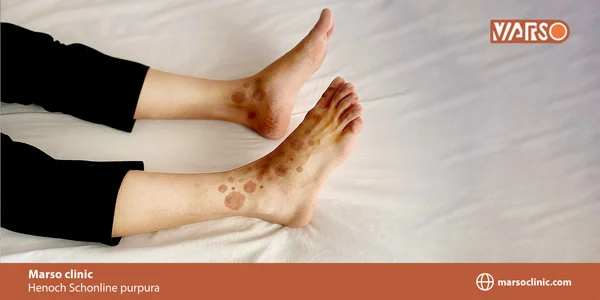If you have a child under the age of twelve, we recommend that you read the rest of this article
Do you know about Henoch Schonline purpura, which is most common in children?
What is Enoch Schweinsteiger’s purpura?
Will my child with Enoch Schweinsteiger purpura be at risk?
In the following our rheumatology specialists will explain Henoch Schonline purpura as a common inflammatory disorder in children aged four to twelve years.
Enoch Schweinsteiger purpura is a transient, uncomplicated inflammation that usually resolves within two to four weeks of onset.
What you will read next:
-
-
-
- Why does Henoch Schonline purpura happen?
- What children are at risk for HSL purpura?
- What are the causes of the beginning of Henoch Schonline?
- What is the mechanism of Henoch Schonline disease?
- What treatments are suitable for Henoch Schonline?
- How long does it take for Henoch Schonline to recover?
- Important points to control the symptoms of Henoch Schonline
- What will it be like in adults?
-
-
Why does Henoch Schonline happen?
Doctors say Henoch Schonline is actually an inflammatory reaction of the baby’s immune system that occurs following the items below:
Recent respiratory infections (the most common cause),
Contact with some chemical compounds
Recent vaccination
In this disorder, inflammation, as an autoimmune reaction of the child’s immune system, occurs in small blood vessels throughout the child’s body.
Involvement in the Henoch Schonline is limited to inflammation of the capillaries and larger vessels are not involved.
A common mistake is that sometimes parents or even some doctors confuse Henoch Schonline purpura with allergic or infectious conditions.
What children are at risk for HSL purpura?
Henoch Schonline is a vascular inflammation or vasculitis that is not common in childhood but is the most common vasculitis or vascular autoimmune inflammation in children aged four to fifteen years.
There is no racial preference and no geographical area preference to catch HSL
The prevalence of Henoch Schonline is said to be slightly higher in spring and autumn than in summer and winter.
Also, the incidence of this vasculitis is equivalent to 20 children per hundred thousand children worldwide annually.
What are the causes of the beginning of Henoch Schonline?
The main reason is still unknown, but some of the possible factors are as follows.
- Viral or bacterial infections, especially respiratory infections
- In most cases, this Henoch Schonline and vasculitis develop following a recent respiratory infection.
- Insect bites
- Some drugs
- Contact with allergens
- Contact with chemicals and some toxins
- Exposure to cold
They can trigger the onset of an inflammatory reaction in a child’s immune system.
What is the mechanism of Henoch Schonline disease?
The immune system of a child with thin arteries and capillaries in the skin, joints, gastrointestinal tract, testis, and sometimes the central nervous system, the brain and spinal cord, is attacked.
Henoch Schonline is not a contagious or inherited disorder and is not preventable, but with early diagnosis, the severity of symptoms can be reduced.
What treatments are suitable for Henoch Schonline?
In summary, the treatment in Henoch Schonline is as the items in the following:
Most sufferers will not need medication and will only need to rest and use painkillers such as acetaminophen and ibuprofen as long as there are symptoms.
- Treatment of patients with joint involvement:
In patients with Henoch Schonline with joint involvement in arthralgia or arthritis, it is necessary to use a group of NSAIDs, anti-inflammatory and analgesic drugs such as ibuprofen and naproxen. So in mild cases, treatment is supportive.
- Treatment of patients with gastrointestinal disorders and testicular swelling:
If there are gastrointestinal symptoms and involvement, the doctor will prescribe oral and sometimes injectable corticosteroids, and in very rare cases, such as gastrointestinal bleeding and testicular swelling, injectable corticosteroids may be necessary.
- Treatment of patients with renal disorders:
If there is a kidney involvement, a kidney biopsy is needed in severe cases and should be treated with corticosteroids or immunosuppressive drugs.
How long does it take for Henoch Schonline to recover?
A period of four to six weeks is usually considered for the completion of the Henoch Schonline, and Fifty percent of children will experience a relapse of the disease within the next six weeks after recovery, which will be much shorter, weaker, and milder than the primary attack.
Important points to control the symptoms of Henoch Schonline
In the acute phase of Henoch Schonline, all physical activity of the child should be limited. After the child recovers, he will resume playing and going to school.
If your child has joint problems, you should stop them from doing activities that will put pressure on the injured joint.
There is no specific diet for a child with Henoch Schonline.
The child should receive age-appropriate foods that include adequate protein, calcium, and a variety of essential vitamins and minerals.
Avoid overeating and eating fatty and high carbohydrate foods in children being treated with corticosteroids as it can cause the child to gain weight and be overweight.
Vaccination should be delayed until complete recovery from HSL, especially attenuated live vaccines! should not be used during treatment with immunosuppressive drugs.
What will it be like in adults?
If an adult woman has this disorder, she will not have any sexual or pregnancy restrictions. The only important point about the side effects of drugs on the fetus is that the use should be done with the knowledge and information of the doctor. If you are a woman who has the symptoms mentioned above and you are planning to become pregnant or even during pregnancy, avoid taking drugs and any self-medication arbitrarily and start your treatment as soon as possible under the supervision of a specialist.

